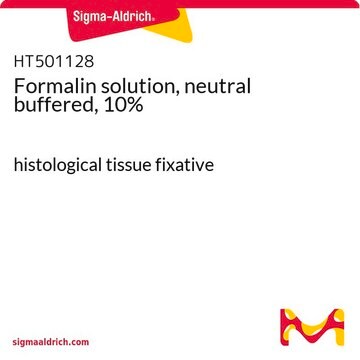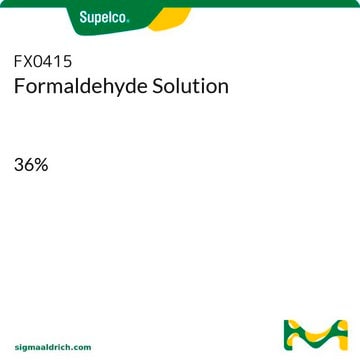15512
Formaldehído solution
meets analytical specification of USP, ≥34.5 wt. %
Sinónimos:
Formalina
About This Item
Productos recomendados
vapor density
1.03 (vs air)
Quality Level
vapor pressure
52 mmHg ( 37 °C)
autoignition temp.
572 °F
quality
meets analytical specification of USP
contains
9.0-15.0% methanol as stabilizer (GC)
concentration
≥34.5 wt. %
25-50%
impurities
acidic reac. substances, complies
residual solvents, complies
ign. residue
≤0.01% (as SO4)
density
1.09 g/mL at 25 °C (lit.)
suitability
corresponds for identity
SMILES string
[H]C([H])=O
InChI
1S/CH2O/c1-2/h1H2
InChI key
WSFSSNUMVMOOMR-UHFFFAOYSA-N
¿Está buscando productos similares? Visita Guía de comparación de productos
Categorías relacionadas
General description
Application
Other Notes
The article number 15512-6X1L-R will be discontinued. Please order the single bottle 15512-1L-R which is physically identical with the same exact specifications.
signalword
Danger
Hazard Classifications
Acute Tox. 2 Inhalation - Acute Tox. 3 Dermal - Acute Tox. 3 Oral - Carc. 1B - Eye Dam. 1 - Muta. 2 - Skin Corr. 1B - Skin Sens. 1 - STOT SE 1 - STOT SE 3
target_organs
Eyes,Central nervous system, Respiratory system
Storage Class
6.1A - Combustible acute toxic Cat. 1 and 2 / very toxic hazardous materials
wgk_germany
WGK 3
flash_point_f
143.6 °F - closed cup
flash_point_c
62 °C - closed cup
Elija entre una de las versiones más recientes:
¿Ya tiene este producto?
Encuentre la documentación para los productos que ha comprado recientemente en la Biblioteca de documentos.
Los clientes también vieron
Nuestro equipo de científicos tiene experiencia en todas las áreas de investigación: Ciencias de la vida, Ciencia de los materiales, Síntesis química, Cromatografía, Analítica y muchas otras.
Póngase en contacto con el Servicio técnico







